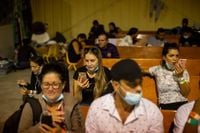In a shocking turn of events, over 936,500 individuals who entered the United States through the CBP One appointment system have received alarming emails from the Department of Homeland Security (DHS) demanding their immediate departure from the country. This unexpected action has left many in a state of panic and confusion, including immigration attorney Liudmila Armas Marcelo, who has been tirelessly assisting her clients during this tumultuous time.
On April 11, 2025, Marcelo, a U.S. citizen and immigration attorney, received the same distressing email that many of her clients were receiving. "It is time for you to leave the United States," the email stated bluntly, indicating that the DHS was terminating the parole previously granted to the recipients along with any associated government benefits, including work permits. The message warned that non-compliance could lead to potential law enforcement actions resulting in their removal from the country.
The emails began arriving in inboxes in early April, often in the middle of the night, catching many recipients off guard. "People panicked," Marcelo recalls, noting that some clients experienced severe anxiety and health issues as a result. The tone of the emails, which Marcelo described as "very aggressive and very frightening," has only added to the distress felt by those affected.
Among those who received the email were Adriana and Luis, two 29-year-old Cuban residents of Odessa, Texas, who entered the U.S. through the CBP One system in November 2023. Both were alarmed upon receiving the notification. "I was worried that it could have been a system error," Luis said, while Adriana expressed her fears about the implications of the email. They quickly reached out to Marcelo for clarification. "Seeing that it has reached people who are even citizens has put my mind at ease," Adriana added.
Marcelo, however, believes that the DHS's failure to accurately identify recipients of the emails has caused significant harm. She criticized the government for not verifying who the recipients were, stating, "They didn’t bother to determine who the person was, whether they actually entered the United States, whether they are in the country illegally or are already residents." This lack of diligence has led to widespread fear and uncertainty in the immigrant community.
As the situation escalated, the government began revoking I-94 entry permits for those who arrived through CBP One, stripping them of their legal status and invalidating their work permits. This has left many wondering whether they should comply with the email’s demands to self-deport or remain in the country and risk further repercussions.
Marcelo strongly advises against leaving the country, especially for those with pending immigration court cases. "If people start leaving, that doesn’t count as voluntary departure, and when the court arrives and the judge asks for the person, he or she will immediately issue a deportation order in absentia," she explained. The attorney fears that this situation could foreshadow similar outcomes for other immigration programs, such as Temporary Protected Status (TPS) or humanitarian parole, which have already faced legal challenges.
In a broader context, the current political climate has heightened anxiety among immigrant families. Millions of young people in the United States are children of immigrant families, and many of these children are experiencing high levels of fear due to the anti-immigrant sentiments prevalent in society. Despite this, all students in the U.S. have a right to public education, regardless of their or their guardians' immigration status, as established by the U.S. Supreme Court in its landmark 1982 decision in Plyler v. Doe.
Educators are urged to recognize the signs of trauma among immigrant children and to create a supportive environment that fosters social and emotional safety. Strategies to help educators better understand the causes of trauma are essential in addressing the needs of these vulnerable students.
As the situation continues to unfold, many immigrant families are left in limbo, grappling with the uncertainty of their status in the United States. The DHS's recent actions have sparked a wave of fear and anxiety, prompting calls for clarity and accountability from the government. Marcelo, along with other immigration advocates, is demanding an explanation for the chaotic handling of the situation and urging officials to prioritize the well-being of those affected.
In the face of such distressing circumstances, the immigrant community remains resilient, seeking support and guidance as they navigate a complex and often hostile environment. The need for comprehensive immigration reform has never been more urgent, as families continue to face the repercussions of a fractured and disorganized system.






